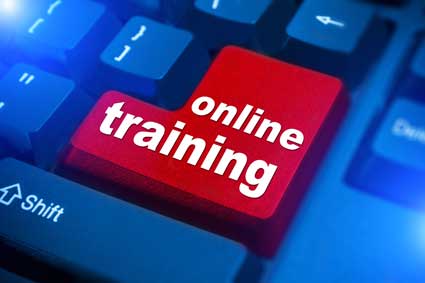Measuring Growth, Establishing Evaluations, Goals and Other Aspects Involving Business Professionalism
There are a few more significant aspects of your business experience that relate to etiquette and professionalism. These matters are extremely important when it comes to performance reviews, setting goals and measuring growth, dismissing an employee, and resigning from your position.
Performance reviews
Depending upon your individual company, the process of performance reviews or evaluations can vary widely. In many positions, a self-review is part of the process. Whether reviews that you give or receive include this component, it is important that you reflect on your own practice (or lack thereof), when it comes to etiquette and professionalism. Everyone can improve, and there have undoubtedly been things during the lessons of this course that you now understand are poor choices, or that you simply know you are guilty of forgetting, or ignoring, the professional thing to do. Beating yourself up over past mistakes isn't helpful or productive for anyone, but reflecting upon the choices you have made in the past can help you make better decisions for your professional career moving forward. During a review, whether it is a self evaluation, or one performed by a colleague or supervisor, you should be able to identify particular areas of potential growth with regard to etiquette and professionalism. It may be difficult to face unflattering truths, but it will serve you better in the future, if you commit to bettering yourself.
If you are giving a performance review to someone on your staff, etiquette and professionalism should carry three times the weight it normally does: First and second, you need to evaluate and reflect upon the etiquette and professionalism of your staff, as well as whether or not you have been setting a good example for them; and third, you need to deliver your evaluation professionally.
There are a few key rules to follow, whether you are receiving or delivering an evaluation or performance review:
-
Take it seriously. Good management means there should be few, if any, issues that come up during the performance review that have not ever been addressed directly with the staff member involved. Everyone should be aware of what the existing problems are, and should come into the review ready to discuss potential solutions.
-
Try to be objective. Both the supervisor and the worker should attempt their best to ensure that a certain measure of objectivity, along with a lack of emotion, is maintained. The measures of a performance evaluation are not a tool for defining who someone is, as a person, and everyone involved should be clear on that.
-
Set goals and measures of success. This will be fleshed out shortly, but understand that without specific goals and objective measurements, along with regular reflection and review, it is unlikely for a person to develop better habits of etiquette and professionalism.
-
Include other necessary personnel. If there's a conflict between the manager and their subordinate, a third party who is more objective should be present, such as an HR person, or someone higher in the chain of command. But anyone who invites a third person to the performance review should give the other party prior notice so that no one feels attacked or manipulated.
-
Listen to each other. While some issues identified in a performance review will be concrete, many of them won't be. A performance review or evaluation should be a dialogue, not simply a report card. Both parties need to understand the perspective of each other in order to make effective decisions moving forward.
-
Set clear consequences and follow through.
Setting goals and measuring growth
Regardless of the frequency with which you have, or give, evaluations, and regardless of whether anyone else has identified potential areas of growth when it comes to etiquette and professionalism, if you have thoroughly read this course, you have undoubtedly identified potential areas of improvement. You don't need someone else to tell you that you can be better; you can start making positive changes and choices immediately, and on your own.
But setting goals is not as simple as stating that you want to be more professional or more courteous. Studies have shown over and over that SMART goals have a higher likelihood of success. If you're not familiar with SMART goals, there's a lot of information out there that can help you; put simply, it means that any goal you set should be specific, measurable, achievable, relevant, and time-bound. When it comes to business etiquette and professionalism, you should set your goals appropriately, based on the areas where you may be lacking.
For example, if you had a difficult time responding to phone messages in a timely manner and want to improve your business etiquette, your goal might be as follows: to return calls and messages within a certain period of time (specific). You could then keep a list of every call you receive and make notes on the list each time you return a call (measurable); set a realistic return call time that works with your business schedule, such as two days (achievable). You know that doing so is courteous (relevant), and while you have already set a time to return the calls, you might also want to set a period of time for which you will perform this activity to make it a habit, such as for one month (time-bound).
Measuring your success, evaluating what does and doesn't work for you, and generally caring enough to try to improve yourself -- whether you're instructed to or not -- can help improve your professional reputation and help you achieve personal growth.
Dismissals
Forced resignations, layoffs, and firings all result in a difficult time for both parties. Emotions run high and keeping calm and behaving professionally is a significant challenge for everyone involved. For this reason, it is that much more important to make every effort to practice proper etiquette, and to behave professionally.
As the supervisor - if you have to terminate an employee, the first thing you need to do is know the laws regarding such actions. Firing someone when they are on medical leave, for example, is typically illegal. You also have to make sure you aren't firing or laying them off for legally protected rights they have, such as going to vote. Secondly, it is always a good idea to have a third party in the room when it occurs. Someone from HR or another manager should be present in case any issues arise; it would be inappropriate to ask someone on the same level as the person being dismissed to be present.
Justify your decision. You don't need to get into an argument or to beleaguer a point, but the person has the right to know why their employment has been terminated. Hopefully, whatever the issues are, you have done your job and communicated them to the employee previously. In the case of a major infraction of the rules or policies resulting in employment termination that has not been a problem prior, it is that much more important for a third party to be present.
Whatever the reason that the employment has been terminated, your job is to behave professionally. Be direct, don't beat around the bush, but be gentle in your delivery and understand that the other person is likely to have a negative reaction, especially if they had no prior notice. The biggest exception to this rule would be if the employee has broken a law; if you intend to file charges, contact the police to be there when you dismiss the employee to help prevent a potentially violent response.
As the employee - if you face a situation where you are having your employment terminated, you are likely to experience all sorts of feelings, some of which may even surprise you. As much as possible, try to maintain your composure and act professionally. If you disagree with a decision that has been made, say so, but without becoming accusatory or angry as much as possible. If you believe that your rights have been violated, or your employer is acting illegally, contact your attorney. You do not have to necessarily accept your situation, but you do need to address it as a professional. You never know when situations will change and you may come back into contact with the company, your former supervisor, a colleague, or someone else -- and they will have more respect for you if you handle the situation well, even if you are not in agreement with it.
Resignation
Ideally, the end of your tenure with each employer will be voluntary. Of course, voluntary is not synonymous with pleasant. You may be voluntarily leaving your company for a number of reasons that may upset you. Nevertheless, leaving professionally is the right thing to do.
Some of the most emotional moments of your career may be when you are crafting letters of resignation. Leaving a job, even one with a lot of negative points, is emotional and complex and scary, but you don't want to include all of that in the last document they will have to measure your professionalism. Instead, embrace the potential of your future and liberation from the parts of your work environment that you are happy to leave. But the question remains - how much information do you include in your letter of resignation?
The answer is up to you. The polite and professional thing to do is to not point to specific fingers or lambaste anyone in particular (or even the company as a whole). You can allude to some of your negative experiences, especially if you want them included in written documentation, but focus your letter on positive attributes regarding your time with the company. You might share something you learned there, or opportunities you experienced, but focus on being positive without lying regarding your experiences. Take your negative emotions and re-frame them in a positive light, even if what that light represents has nothing to do with the company, and all to do with your bright future.























